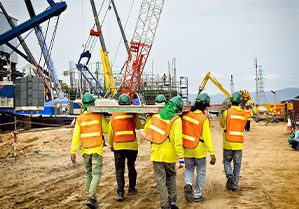By: John Schulte, CRIS, CLCS / Sales Executive
Builder’s Risk policies provide critical financial protection for the stakeholders in a construction project by providing insurance for the physical project during the course of construction. These stakeholders include the owner, the general contractor, all subcontractors, and more. Today, many are wondering what impact COVID-19 will have on construction projects, how Builder’s Risk policies may respond, how underwriters will react, and what changes contractors will need to make as projects slow, stop and restart.
Projects are being delayed due to physical distancing requirements, screening protocols, owner-requested work stoppages, government-issued work stoppages, and skilled labor and supply shortages. Unfortunately, like most property policies in the market today, Builder’s Risk policies offer little to no insurance coverage for COVID-19 delays or losses. The typical wording requires physical damage to the property to trigger coverage. Additionally, the majority of policies include virus or bacteria exclusions. However, contractors should review their policies and document any loss of income due to delays.
With that said, the time will come when in-force Builder’s Risk policies will have to be extended or modified to the revised construction schedule. In the worst cases, insurance companies may cancel a policy prior to project completion. But at a minimum, underwriters will use policy extensions as an opportunity to alter terms, conditions, and of course, pricing. They will carefully examine proactive measures taken regarding job site security and water damage prevention.
Because of this, it is imperative for contractors to inform their broker of any delays and provide details on why the project was halted. Furthermore, they may need to make some changes to how they operate. For job site security, controls such as fencing and lighting are expected while 24-hour video surveillance and intermittent patrolmen are advised. In the case of water damage, shutting off water valves is essential while purchasing leak prevention technology should be considered.
For Builder’s Risk extensions, the key to preventing increased expenses and less favorable terms is communicating with brokers and implementing loss prevention strategies now. More than ever, The Horton Group is here as a resource to be of assistance to both clients and prospects. Don’t hesitate to reach out with any questions you may have.
Material posted on this website is for informational purposes only and does not constitute a legal opinion or medical advice. Contact your legal representative or medical professional for information specific to your legal or medical needs.




